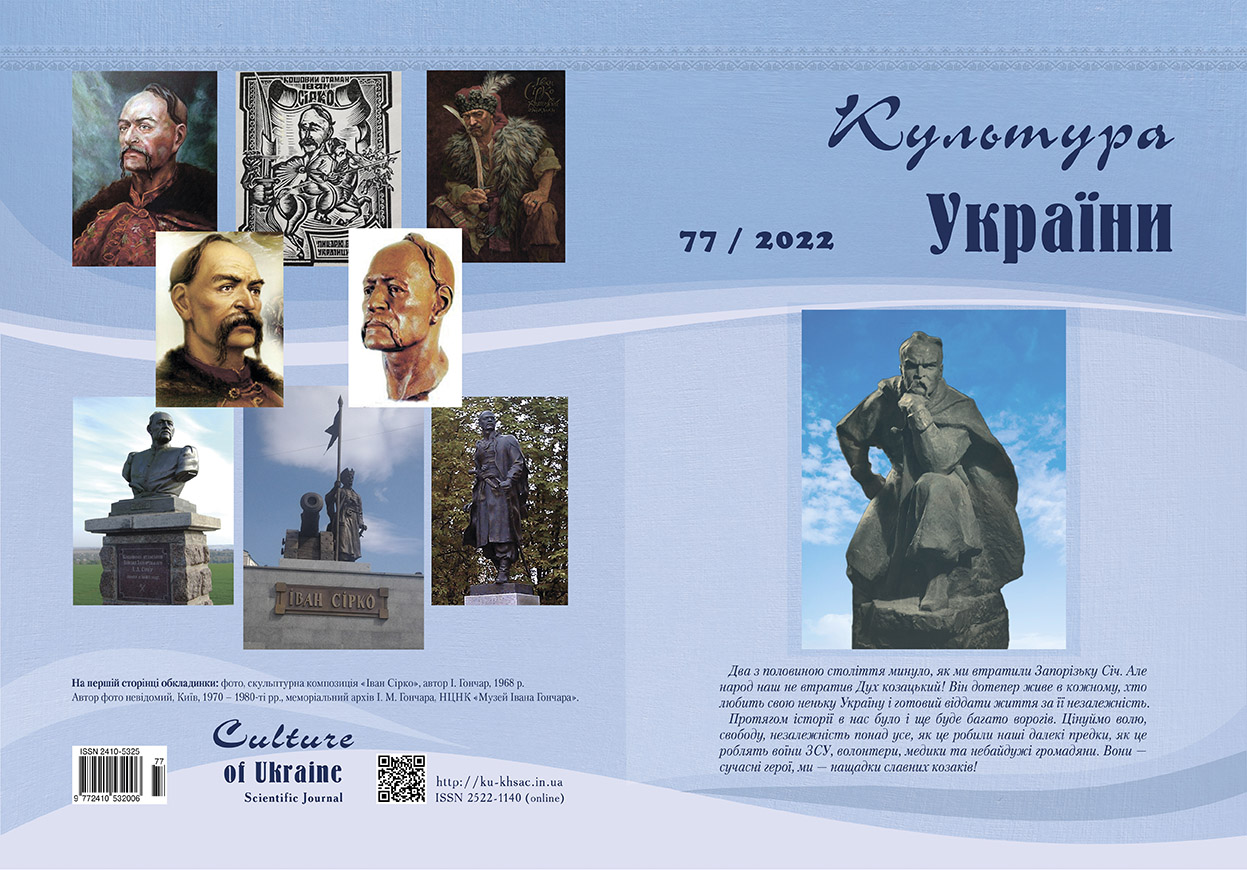Туризм: проблеми та перспективи розвитку під час війни
DOI:
https://doi.org/10.31516/2410-5325.077.07Ключові слова:
туризм і війна, тероризм, туристична діяльність, «туризм пам’яті», туристичний «ландшафт»Анотація
Розглянуто, як зарубіжні, так і вітчизняні наукові праці аналізують різні аспекти розвитку туризму під час воєнних дій та терористичних загроз. З’ясовано, що cтрімкий розвиток сучасного туризму, наявність у цей період воєнних конфліктів та багаточисельні зв’язки між війною й туризмом спонукали багатьох дослідників звернутися до цієї проблеми. Темою досліджень стали складні відносини між війною та туризмом з урахуванням всього спектра їхньої динаміки, включаючи політичні, психологічні, економічні та ідеологічні фактори на різних рівнях, у різних політичних і географічних точках. Відзначено, що дослідження теми впливу воєнних дій на туризм в Україні лише починаються і вони є досить фрагментарними та епізодичними. Проаналізовано досвід країн, які успішно відновлюють туристичну галузь після війни, і їх накопичений досвід у цій сфері має стати підґрунтям для України в розробці власних планів щодо існування та подальшого розвитку туризму в країні.
Посилання
Antonenko, V. S. (2015). Interstate and regional military and ethno-religious conflicts as a limiting factor in the development of tourism. Hostynnist, servis, turyzm: dosvid, problemy, innovatsii: abstracts of reports of the 2nd International Scientific and Practical Conference, Kyiv, April 23, 2015, Vol. 2, pp. 12–16. Kyiv National University of Culture and Fine Arts Publishing Center. https://dspace.uzhnu.edu.ua/jspui/bitstream/lib/8760/2/%D0%A2%D0%B5%D0%B7%D0%B8%20%D0%9A%D0% 9D%D0%A3%D0%9A%D1%96%D0%9C.pdf#page=12. [In Ukrainian].
Zavarika, H. M., Solodovnyk, A. V. (2019). The impact of the conflict period on the development of international tourism. Heohrafiia ta turyzm. V. 39. V. I. Vernadskyi National Library. http://www.irbis-nbuv.gov.ua/cgi-bin/irbis_nbuv/cgiirbis_64.exe?C21COM=2&I21DBN=UJRN&P21DBN=UJRN&IMAGE_FILE_DOWNLOAD=1&Image_file_name=PDF/gt_2017_39_5.pdf. [In Ukrainian].
Parfinenko, A. Yu. (2015). International tourism in Ukraine: geopolitical aspects of a global phenomenon. Actual problems of international relations. Release 126 (part I). P. 12–23. [In Ukrainian].
Savchenko, I. A. (2015). The impact of terrorism and military operations on international tourism. Electronic Repository of Volyn National University Institutional. http://95.217.214.133/bitstream/123456789/11259/1/Savchenko%20I.%20%D0%90.pdf. [In Ukrainian].
Ukrainian Cultural Fund. (2022). https://ucf.in.ua/. [In Ukrainian].
Alluri, R. M. (2009). The Role of Tourism in Post-Conflict Peacebuilding in Rwanda. Swisspeace. [In English].
Araña, J. E., & León, C. J. (2008). The impact of terrorism on tourism demand. Annals of tourism research, 35(2), 299–315. [In English].
Bachimon, P. and Dérioz, P. (2010). “Tourisme affinitaire”, Téoros. Revue de recherche en tourisme, Vol. 29, n°1, disponible sur. http://teoros.revues.org/496. [In French].
Bechtel, D. and Jurgenson, L. (2013). Le tourisme mémoriel en Europe centrale et orientale, Pétra (Editions). [In French].
Butler, R. and Suntikul, W. (2013). “Tourism and war: an ill wind?” in Butler, R. and Suntikul, W. (eds.), Tourism and War. Routledge. [In English].
Causevic, S. and Lynch, P. (2011), “Phoenix Tourism: Post-Conflict Tourism Role”, Annals of Tourism Research, Vol. 38, n°3, p. 780–800. [In English].
Cyprus: Selected Issues; IMF Country Report (2021). No. 21/126. International monetary fund. https://www.imf.org. [In English].
Economic impact of COVID-19 on tourism and remittances: Insights from Egypt. (2021). IFPRI. https://www.ifpri.org/blog/economic-impact-covid-19-tourism-and-remittances-insights-egypt. [In English].
Economic Impact Reports. (2021). World travel & tourism council. https://wttc.org/Research/Economic-Impact. [In English].
Elliott, A. and Milne, D. (2019). “Introduction. War, Tourism, and Modern Japan”, Japan Review, Vol. 33, Special Issue, pp. 3–28. [In English].
Feridun, M., & Shahbaz, M. (2010). Fighting terrorism: are military measures effective? Empirical evidence from Turkey. Defense and Peace Economics, 21(2), 193–205. [In English].
Fleischer, A., & Buccola, S. (2002). War, terror, and the tourism market in Israel. Applied Economics, 34(11), 1335–1343. [In English].
Gordon, B. M. (1998). “Warfare and Tourism: Paris in World War II”. Annals of Tourism Research, Vol. 25, Number 3, pp. 616–638. [In English].
Gray, J. M., & Wilson, M. A. (2009). The relative risk perception of travel hazards. Environment and Behavior, 41(2), 185–204. [In English].
Kassouha, Z. A. (2018). Le tourisme en Syrie, passé, présent, futur : entre résilience et réinvention [Thèse de doctorat, Université d’Avignon et des Pays de Vaucluse]. Avignon. [In French].
Lennon, J. J. and Foley, M. (2000). Dark tourism. The attraction of death and disaster. Cengage Learning EMEA. [In English].
Predicting Travellers’ Impact. (2022). https://forwardkeys.com/. [In English].
Saha, S., & Yap, G. (2013). The Moderation Effects of Political Instability and Terrorism on Tourism Development. Journal of Travel research, 53(4), 509–521. [In English].
Walton, J. (1996). “Leisure Towns in Wartime: The Impact of the First World War in Blackpool and San Sebastián”, Journal of Contemporary History, Vol. 31, Number 4, pp. 603–618. [In English].
Zeid A. Kassouha (2019). Post-conflict tourist landscapes: between the heritage of conflict and the hybridization of tourism activity. Observations from Bosnia and Herzegovina. OpenEdition Journals. https://journals.openedition.org/viatourism/3984. [In English].
##submission.downloads##
Опубліковано
Номер
Розділ
Ліцензія

Ця робота ліцензується відповідно до Creative Commons Attribution-NonCommercial-ShareAlike 4.0 International License.
Автори, які публікуються у цьому журналі, погоджуються з наступними умовами:
У разі публікації статті в журналі «Культура України», автори зберігають авторське право, а також надають право журналу публікувати оригінальні наукові статті, що містять результати експериментальних і теоретичних досліджень і не знаходяться на розгляді для опублікування в інших віданнях. Всі матеріали поширюється на умовах ліцензії Creative Commons Attribution-NonCommercial-ShareAlike (BY-NC-SA), яка дозволяє першу публікацію в цьому журналі, а також розповсюдження роботи з визнанням авторства цієї роботи, на тих самих умовах, з некомерційною метою.
Автори мають підписати заяву, яка є угодою про надання прав редакції на публікацію статті в друкованому та електронному вигляді. Заява надсилається на поштову (оригінал) або електронну адресу (сканована копія) Редакції журналу.
Автори мають право укладати самостійні додаткові угоди щодо неексклюзивного розповсюдження роботи у тому вигляді, в якому вона була опублікована цим журналом (наприклад, розміщувати роботу в електронному сховищі установи або публікувати у складі монографії), за умови збереження посилання на першу публікацію роботи у цьому журналі.
Під час подачі рукопису статті для опублікування у збірнику «Культура України» автори погоджуються з тим, що, у разі прийняття статті до публікації, її можна буде розмістити в електронних архівах та базах даних з обов'язковим зазначенням авторства і збереженням авторських прав у повному обсязі за авторами. У тексті самої роботи мають бути в повному обсязі представлені джерела зовнішньої інформації – у вигляді списків джерел літератури (у т.ч. особисті раніше опубліковані роботи авторів). Автори рукопису статті зобов'язані належно оформляти запозичення у вигляді цитат або посилань. Будь-які форми плагіату неприпустимі.


